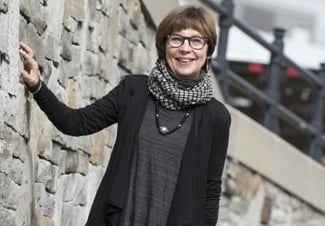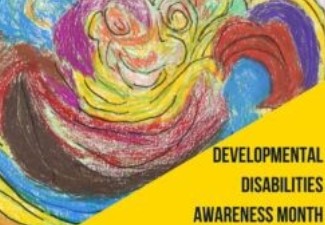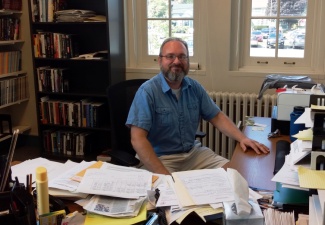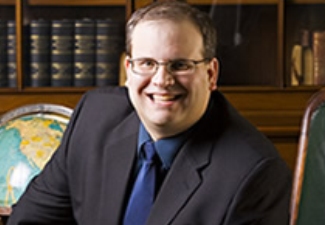SUNY Plattsburgh Music Department to Present Winter Jazz Concert Featuring Vibraphone Legend Warren Chiasson
SUNY Plattsburgh’s Department of Music will present the 2012 Winter Jazz Concert directed by Dr. Rick Davies at 7:30 p.m. Friday, Nov. 30, in the E. Glenn Giltz Auditorium, Hawkins Hall.
The SUNY Plattsburgh Mambo Combo and Jazz Ensemble will perform with special guest artist Warren Chiasson, whom the New York Times called one of the most important vibraphonists in the history of jazz.
Chiasson has had a long career that includes stints with many of the top musicians in jazz, including the celebrated quintet led by George Shearing in that pianist’s heyday. He also substituted for Lionel Hampton, playing with Benny Goodman in “From Spirituals to Swing” at Carnegie Hall, a recreation of the famous 1938 Goodman concert, on the 50th anniversary of the event.
The New York Times describes Chiasson as "One of the six top vibraphonists of the last half century."
Originally from Nova Scotia, Chiasson can often be found visiting friends and family in the Plattsburgh area.
The event is free and open to the public.
About Chiasson
Vibrophonist Warren Chiasson is well known in the jazz world for the distinctive four-mallet technique that he weaves into a percussive, melodic style.
Prior to forming his own group, Chiasson was best known for his creative contributions to the Chet Baker Quartet, the Tal Farlow Trio and jazz/pop diva Roberta Flack. In addition to recording his own albums, he has played on more than 100 recordings with such artists as Eric Dolphy, Bill Dixon, Hank Crawford and was featured on a Grammy Award-winning album with B.B. King
His own albums include "Quartessence"; "Good Vibes for Kurt Weill," which was selected as a Billboard Pick of the Week; and "Point Counterpoint" with guitarist Chuck Wayne.
Chiasson, a self-taught musician, was born in the tiny French Acadian fishing village of Cheticamp, Nova Scotia, and grew up in the culture of Cape Breton folk music. His family moved to the larger town of Sydney and his formal musical training began at age nine with classical violin lessons. By 13, he was playing sessions with noted Scottish fiddlers of the day and performing at dances, stage shows and radio shows. Later, he played the trombone in high school.
When Chiasson was 15, he was profoundly inspired by a George Shearing recording of "I'll Remember April," which led him to study modern jazz. He listened to the records of Shearing, Charlie Parker, Lennie Tristano and Duke Ellington, practicing late into the night and memorizing their solos on the piano and guitar.
But the seeds of his career were not sown until he entered St. Francis Xavier University in Nova Scotia and bought a small xylophone after seeing Lionel Hampton perform in Hampton’s home town. Once he started practicing this instrument, he decided immediately to make music his career. He left college and enlisted as a trombone player in the Royal Canadian Artillery Band, all the while practicing the vibes more than eight hours a day.
Finally, his jazz studies paid off during a trip to New York, when a chance meeting with a promoter led to a vibraphone audition with The George Shearing Quintet. A week later, he was part of the quintet, touring the world and playing opposite the likes of Dave Brubeck and The Modern Jazz Quartet.
Chiasson has collaborated with some of the finest musicians in jazz including Paul Bley, Ron Carter, Roland Hanna and the late Jimmy Garrison from the original John Coltrane Quintet. In the late 1960s and early 1970s, the Warren Chiasson/Jimmy Garrison Duo played regularly at Gregory's in New York City, while Chiasson also hosted a weekly jam session at the Signs of the Zodiac in Harlem. Regular guests included Charlie Haden, Lee Konitz, Joe Farrell, Wilbur Ware and Joe Chambers.
Chiasson is actively involved in jazz education and continues to travel extensively, performing at concerts and festivals. Recently, at the 20th anniversary of the Atlantic Jazz Festival in Halifax, Nova Scotia, Chiasson was honored for his creative contributions to jazz and for being the first musician from eastern Canada to forge an international jazz career, thereby paving the way for others to follow. The concert was recorded by CBC RADIO for national air play.
News
Knelly Named Special Adviser to SUNY for Clinton Transition

Quebec Studies Presents Montreal Historian in Virtual Talk on 1913 School Strike

Campus Shines Light on Developmental Disabilities During Awareness Month and Beyond
Black Solidarity Day Officially Added to SUNY Plattsburgh’s Academic Calendar

SUNY Plattsburgh Political Science Professor to Zoom a Discussion on the Russian Invasion of Ukraine
